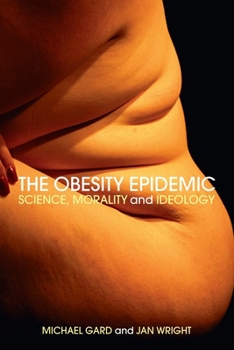The Obesity Epidemic: Science, Morality and Ideology
Select Format
Select Condition 
Book Overview
Increasing obesity levels are currently big news but do we think carefully enough about what this trend actually means? Everybody - including doctors, parents, teachers, sports clubs, businesses and governments - has a role to play in the 'war on obesity'. But is talk of an obesity 'crisis' justified? Is it the product of measured scientific reasoning or age-old 'habits of mind'? Why is it happening now? And are there potential risks associated...
Format:Paperback
Language:English
ISBN:0415318963
ISBN13:9780415318969
Release Date:April 2005
Publisher:Routledge
Length:226 Pages
Weight:0.95 lbs.
Dimensions:0.5" x 6.2" x 9.2"
Customer Reviews
5 ratings
Indispensable Perspectives
Published by Thriftbooks.com User , 14 years ago
The authors make for a very compelling review of the literature ranging from sociology, psychology, nutrition, physical education, philosophy of science, political science and history. They illuminate the results of what happens when science and morality combine to form public opinion and policy. The "moral panic" evident in the news coverage as well as much of the scientific coverage of obesity is outlined and throughly explored coming to the conclusion that there are many things that science alone will never be able to tell us about how individuals should live and that science is never as unbiased/objective as many would like to believe. I believe that this book should become required reading for those studying nutrition, medicine, public policy or public health.
Reality Based Science Takes New View on Obesity
Published by Thriftbooks.com User , 15 years ago
This book takes a look at a variety of obesity research with a fresh eye. It assumes nothing, and what is revealed with this unbiased eye will surprise and amaze most readers. As many know, diets don't work. This helps explain why. Fat people aren't fat due to gluttony. Exercise, while it may be good for people of all sizes, does not contribute much to body size except in extreme cases. Twin studies and meta-analyses are methodically reviewed. Much of what passes for facts or science in the public debate on obesity, is really more about morality and ideology. Well done!
Great starting point for researching weight hysteria, little on physiology
Published by Thriftbooks.com User , 16 years ago
The book is a fairly dense read wherein the authors endlessly cite research on weight and activity-levels. I think one of the best points they make is how we really cannot conclude, from the evidence they cite, that our bodies are machines where an alegebra of energy-in/energy-out explains our weight. Indeed, the diversity of individual reactions to exercise and food makes it difficult to say exactly what "program" should be advocated. They also draw interesting parallels between moralizing over weight and simply citing statistics that support this value judgment that fat is bad. However, it is true that one wishes for more explanation of how we understand, if not yet fully, human physiology, digestion, etc. which would, to laypeople like myself, seem critical to understanding how weight and health are interlinked.
Healthy skepticism perhaps overdone
Published by Thriftbooks.com User , 18 years ago
The whole effort to counter the hysteria over overweight makes a certain sense. The revealing of how problematic categories for defining 'overweight' are is also important. I am not sure however that their discounting of scientific approaches to weight- loss is correct. Nor am I sure that their placing a great part of the burden on socio-economic factors is the correct direction for the society to take. And this when there is obviously a real difference between the thinner, wealthier population and the heavier, poorer population. But is there any doubt whatsoever tht being overweight is a major factor in the epidemic of Type 2 Diabetes which the world, and not only the Western world is experiencing. Is there too any doubt that being significantly overweight is a major risk factor in heart disease and stroke? Is there any question that arthritic and joint illnesses are aggravated by overweight? It is one thing to point to the hysteria and exaggerations, and another to go all the way to the other side and poo- poo the public health danger, and individual danger of being overweight.
The politics of fat
Published by Thriftbooks.com User , 19 years ago
A sceptical look, by two Australians, at what we know and (more especially) at what we don't know, about obesity. The authors believe "It ain't what folks don't know is the problem so much as what they think they know that ain't so." The central message could be phrased as that fatness doesn't matter as much as they try to make you think, but that would be oversimplifying it. There's nothing simple about this book. I started it thinking I knew a lot more about obesity than when I finished it. The authors write elegantly with sharp wit, but even so it is rather heavy going because of the density of information and closely reasoned argument. Although it is an important book it it difficult to know who to recommend it too, maybe anybody in the health or education field who enjoys good writing and doesn't mind having their assumptions shaken.. It's not a self-help book for dieters. The Australian perspective is interesting. Americans are still reeling from finding they are the world's fattest men (apart from some Pacific islanders) and the British are upset from finding that they are the least athletic white nation, with curling as their only Olympic gold. The skinny athletic Australians have managed to convince themselves that they are slothful overeaters






